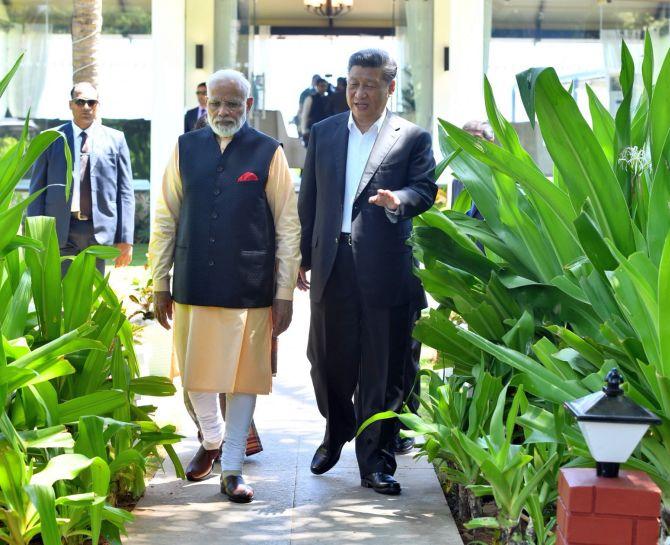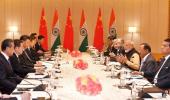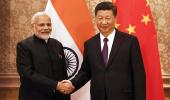'Keeping Kashmir out of the informal summit does not mean that they have given up their strategic interest.'

"Unless the border issue is resolved we can't be certain of China because it has made territorial claims on India," Jayadeva Ranade, former additional secretary, Cabinet secretariat, and President, Centre for China Analysis and Strategy, tells Rediff.com's Archana Masih.
- Part I of the Interview: Why Xi did not raise Kashmir with Modi
Will Ladakh be a bone in the throat of India-China relations?
It will, but at the moment they have set it aside and don't want to spoil the atmosphere.
I don't see them (China) handing over Aksai Chin to India or surrendering their strategic interest in the Karakoram or the northern area of Pakistan or in Gwadar.
Keeping Kashmir out of the summit does not mean that they have given up their strategic interest. It just means they are showing to us that our relationship is better and we can handle that somehow or the other.
It will be an issue, but only time will tell how serious it becomes.
What are the obstacles in India-China relations going ahead?
There are three obstacles:
1. The border. Unless the border issue is resolved we can't be certain of China's claims because it has made territorial claims on India.
It has claimed the whole of Ladakh and made repeated claims over it as recently as May this year.
It has laid a claim to Arunachal Pradesh and the whole of J&K is shown as disputed by them. Since 2010 there has been a change in their claims to our territory.
2. It is China's own ambition to be the number one power in the world. They want to create a community of common destiny which will be problematic for India.
3. To get there China has to be number one in this region. I don't think India is willing to accept a subordinate position. Practically they are stronger and have more clout, but we have not given in to them.
I don't think Japan will either.
Accepting China as the number one power in the Asia-Pacific is not going to be easy. India is not going to roll over and just accept it.
India also wants an equal share. India also wants to be a big power and that is why China is opposing India in the UN security council, NSG (Nuclear Suppliers Group) and other international platforms.
China wants to be the only Asian power in those places.
Can we trust the Chinese? Have informal summits overcome the trust deficit?
It is too early. We have to keep our powder dry and stay very alert. Trust is based on track record and time, at the moment we have neither.
There are a lot of exercises taking place on their sides, there are a lot of references to India in their military newspapers. All this does not fit in this warm hospitable climate of the informal summit.
Do you think India will join the RCEP (Regional Comprehensive Economic Partnership) keeping the RSS/Swadeshi Jagran Manch's opposition? Can India afford to not join the RCEP?
Political parties are sensitive to the policies followed by the government.
The government has given protection to certain sectors of the economy. You and I may disagree with which sectors should get it or not, but there are certain very poor people dependent on those protections like our farmers.
The government has to be very sensitive when it moves ahead with the RCEP because it would mean the abolishing of several protections and allowing products from those countries to flow into India.
Our industry is not competitive enough to face this and will be in trouble.
That is why negotiations will be protracted and fairly tough.
Will it be easier to get a trade deal and other negotiations keeping the fact that President Xi's position is weakened compared to before?
The Chinese are hard bargainers and hard negotiators. They have a huge $14 trillion economy. They are a manufacturing hub looking for markets and we have the biggest market, they want to tap the Indian market.
There are already plenty of Chinese products in our market.
India is competing from a weaker position, but at the same time India is also a tough negotiator.
We negotiated our way through WTO with the Americans, but the Chinese are going to pressure us more.










